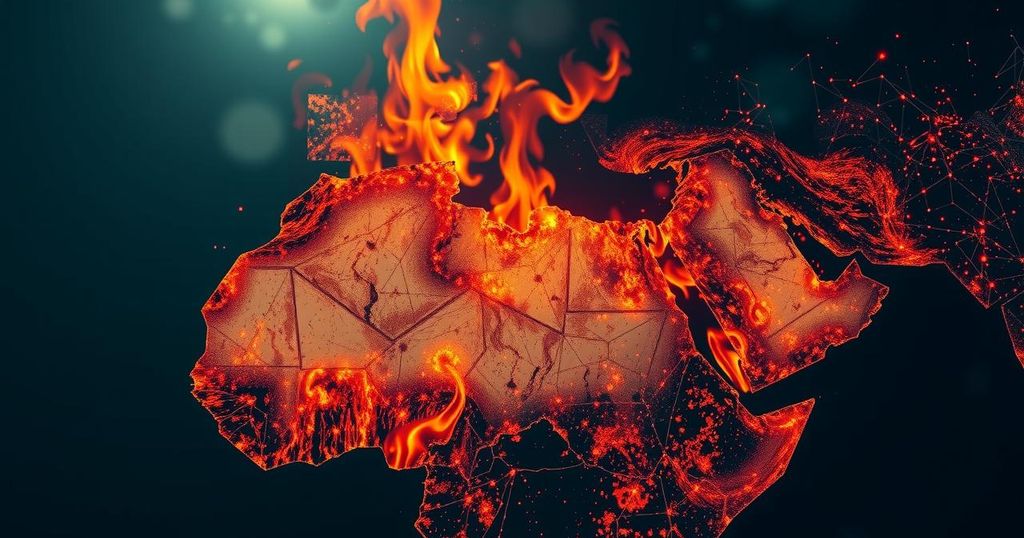Tensions are escalating in the Horn of Africa as Egypt, Somalia, and Eritrea explore a collective security alliance against Ethiopia, amidst Ethiopia’s troubling engagement with Somaliland. The region has seen devastating conflicts; the situation could evolve into proxy conflicts reminiscent of the Cold War, contingent on Ethiopia’s moves regarding its agreements and regional rivalries.
The Horn of Africa is undergoing a significant diplomatic upheaval, as recent discussions among the leaders of Egypt, Somalia, and Eritrea suggest the establishment of a joint security alliance aimed at countering Ethiopia’s influence in the region. Convening in Asmara on October 10, 2024, the leaders engaged in talks that could potentially encompass collective security measures or even economic sanctions against Ethiopia, thus exacerbating existing tensions in an area already afflicted by instability. Since August 2024, Egypt has been consolidating military cooperation with Somalia, laying the groundwork for a similar pact with Eritrea. This is particularly pertinent in light of ongoing conflicts, including the devastating civil war in Ethiopia, which has resulted in over 600,000 fatalities, and the ongoing strife in Sudan leading to more than 150,000 deaths and millions displaced. The recent controversial agreement between Ethiopia and Somaliland—an independent region recognized only by Ethiopia—further complicates the situation. This deal grants Ethiopia direct access to the Red Sea via the port of Berbera in exchange for recognizing Somaliland’s sovereignty, a move met with strong disapproval from Somalia and other neighboring nations such as Egypt and Eritrea. With Ethiopia poised to potentially establish a naval presence, fears of increased regional hostility are mounting. The alignment of Egypt, Somalia, and Eritrea signifies a strategic maneuver intended to encircle Ethiopia, particularly in regard to long-standing disputes over the Grand Ethiopian Renaissance Dam. Egypt perceives this project as a critical threat to its water security, and the new arrangement with Somaliland only intensifies this perception. Furthermore, Somalia grapples with internal instability manifested in the form of an empowered Al Shabab. The group has grown increasingly dangerous, collaborating with foreign militants while acquiring advanced weaponry through illicit channels, notably ties to Iran. Such developments hinder Somalia’s ability to manage its territory effectively. Eritrea, too, remains isolated and is dealing with its own challenges, including persistent international sanctions. The dynamics between Eritrea and Ethiopia could shift, particularly if Ethiopia opts to rescind its commitment to the Algiers Agreement, which has historically curtailed hostilities between the two nations. In this climate, the potential for proxy conflicts reminiscent of Cold War tensions looms large. This evolving alliance will influence regional diplomacy and could lead to economic sanctions and increased military collaboration, thus disrupting trade routes throughout the Horn of Africa. Potential outcomes include Ethiopia retreating from the Somaliland agreement in favor of negotiations or, conversely, escalating conflicts among regional powers. Meanwhile, preliminary indications suggest that Ethiopia employs a cautious strategy, biding its time as it considers its next moves in this fraught geopolitical landscape. With the looming specter of war, the Horn of Africa is rapidly emerging as a critical flashpoint that necessitates the attention of the international community. As it grapples with the potential fallout from shifting alliances and longstanding tensions, neglecting this region could have dire consequences for global stability.
The Horn of Africa has been plagued by deep-rooted conflicts and geopolitical tensions, particularly stemming from Ethiopia’s internal crises, which have drawn in regional powers like Egypt and Somalia. Amidst these challenges, the emergence of Somaliland as a point of contention in Ethiopian politics has galvanized neighboring nations to reconsider their alliances, leading to a flurry of diplomatic activities designed to counter Ethiopia’s burgeoning influence. Moreover, the strategic significance of water resources and trade routes, particularly relating to the Blue Nile’s Grand Ethiopian Renaissance Dam, further enhances the stakes in the region’s ongoing power struggle.
In conclusion, the Horn of Africa finds itself at a critical juncture as the formation of a tripartite alliance among Egypt, Somalia, and Eritrea may lead to significant shifts in the region’s geopolitical landscape. The evolving dynamics, sparked by Ethiopia’s controversial engagements with Somaliland, portend a potential escalation of conflict, mirrored in Cold War-era proxy battles. Failure to address these tensions could result in dire humanitarian crises, necessitating immediate attention from the global community to forestall devastating outcomes.
Original Source: www.orfonline.org







